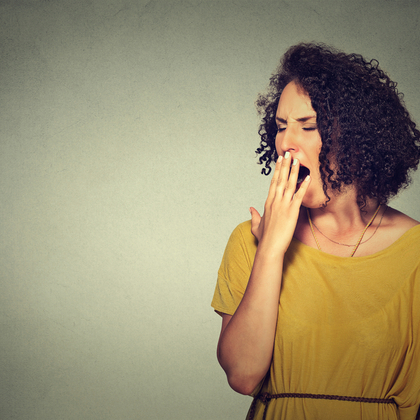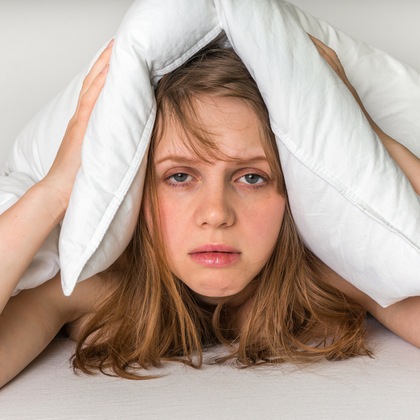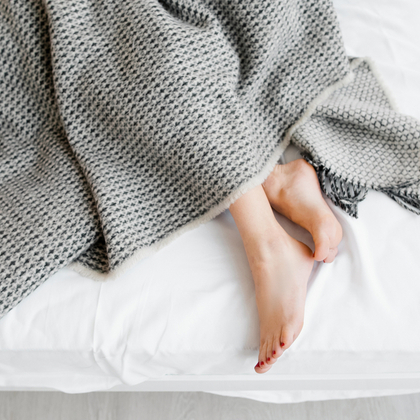
Being caught in a cycle of tiredness and sleeplessness can be desperately frustrating. Just one night of broken sleep can leave you feeling out of sorts the next day, impacting your productivity, immunity, and emotional health. Often, poor sleep hygiene is responsible.
Fortunately, there’s plenty you can do when rest feels unattainable. Here, we outline some of the reasons why you might be feeling tired, along with helpful suggestions on how to improve sleep hygiene.
Why am I feeling so tired?
Sleep experts generally agree that good sleep hygiene leads to good sleep, and poor sleep hygiene leads to poor sleep. That’s why sleep hygiene is increasingly seen as a key component of public health strategy to mitigate the risks associated with poor sleep1.
Healthy habit-forming is a fundamental component of human wellbeing – and this is the basis on which sleep hygiene is built2. Originally developed to treat mild to moderate insomnia, sleep hygiene involves cultivating healthy daily habits, following a nightly routine, sticking to a consistent sleep schedule, and optimising your bedroom to enhance your sleep quality and better your overall health3.

The central premise of sleep hygiene – adjusting the environment and habits to improve sleep – is universal for everyone. However, precisely what rituals to follow daily and nightly may vary from person to person.
What are the signs of poor sleep hygiene?
The following signs may indicate that you could improve your sleep hygiene:4
-
Delayed sleep onset (struggling to fall asleep)
-
Frequent sleep disturbances
-
Excessive daytime sleepiness
-
Lack of consistency in sleep quality or quantity
-
Moodiness
-
Irritability
-
Low mood
-
Forgetfulness
-
Poor concentration
-
Lack of motivation
-
Increased appetite
-
Decreased libido
How can I improve my sleep hygiene?
Implement healthy daily habits
Paradoxically, thinking about sleep should start as soon as you wake up in the morning. Making an effort to follow the same daily habits will improve your sleep hygiene and support your overall health.
-
Get 20-minutes of morning sunlight every day
Exposure to morning sunlight is an essential part of our evolutionary heritage since it helps regulate our 24-hour body clock or circadian rhythm. A robust light and dark pattern – more natural light in the morning and less light at night – is vital for high-quality sleep5.
-
Exercise regularly, but not too late in the evening
Regular exercise facilitates sleep by reducing sleep onset, raising core body temperature – which then drops and promotes sleepiness – and supporting emotional health6.
While some people aren’t affected by late-night exercising, it can still be disruptive. Intense exercise elevates cortisol levels when they should be naturally declining, which might delay sleep onset7.Try to limit any vigorous activity to earlier in the day and aim to have completed all workouts at least 90-minutes before bed. -
Reduce alcohol consumption
Although alcohol can make you feel drowsy, its sedative effects soon wear off and can lead to increased night-time arousals, even if you don’t remember waking up8.
Late-night drinking also reduces REM sleep – the deepest stage of sleep, where learning occurs, dreams happen, and memories are consolidated9.
The best time to metabolise a moderate amount of alcohol is early evening. -
Avoid caffeine after midday
Caffeine is known to extend sleep latency (the time it takes to fall asleep), reduce total sleep time, diminish sleep efficiency, and worsen perceived sleep quality10.
Caffeine also has a half-life of six hours, which means if you brew a coffee at 4 pm, half the amount of caffeine will still be in your system around bedtime.
To support your sleep, try to enjoy your caffeine before midday.
Follow the same night-time rituals
Sleep is like landing a plane; it takes time to descend. Try to follow the same rituals and practices each night to prepare your body for rest.
-
Be consistent – have a fixed sleep and wake-up time
Try to follow the same sleep-wake pattern every day, even at the weekends and even if it means feeling tired in the morning. This consistency is key in helping regulate your circadian rhythm and achieve restful sleep.
-
Have a wind-down routine
Humans thrive on structure and routine. And following the same wind-down routine every night – around 30-90 minutes before bed – will help train your body and mind to prepare for sleep.
Ultimately, this routine should be relaxing. You may want to soak in a bath, diffuse essential oils in your bedroom, or read a book by a soft lamp. Do whatever you need to prime your body for rest, and practice the same activities every night. -
Avoid commotion before bed
Scary films, discussions about finances, and strongly-worded work emails aren’t conducive to quality sleep. Instead of winding you down for sleep, they wind you up. Try to manage any emotional commotion before bed that may get between you and restful sleep.
-
Take time to relax
Many of us get tangled up in ruminations bed. But anxiety and stress can make it harder to fall asleep. To help you relax before bed, you may want to consider mindfulness techniques, deep breathing, or using essential oils.
If you’re struggling to manage anxiety, Theanine and Lemon Balm, Magnesium, and St John’s Wort could be useful additions. -
Disconnect from technology 90-minutes before bed
Late-night screen use throws your body’s natural sleep-wake cycle out of whack. Electronic devices emit blue light, which suppresses the production of your sleep hormone, melatonin11. Using technology can also mentally stimulate you before bed.
Similarly, you may want to turn any bright overhead lights off in the evening. Instead, use soft lamps and candles to help you prepare for sleep.
Adjust your sleep environment
Aside from behavioural changes, optimising your bedroom environment is also an important pillar of good sleep hygiene. In essence, your bedtime needs to be inviting, comfortable and conducive to rest.
-
Block out light
Darkness triggers the production of melatonin, which signals it’s time for rest. That’s why it’s so important to ensure your bedroom is completely dark at night.
For a good night’s sleep, you need to exercise a zero-tolerance policy against all light sources in your bedroom. You may wish to fit blackout blinds or use an eye mask while sleeping. -
Ensure your bedroom is temperate
The optimal temperature for sleeping is 16-18 degrees. Make sure your bedroom is temperate and comfortable. You may want to sleep with the window open ajar, change your duvet depending on the season, or wear different pyjamas.
-
Reduce noise
Sleeping in a quiet environment is also essential. To drown out any noise, you could invest in a pair of earplugs or a white noise machine.
-
Use comfortable bedding
Your bed should be an inviting place to rest. Ensure your bedding, sheets, mattress, and pillows are comfortable and cater to your needs.
It doesn’t take much to throw your sleep out of whack. Fortunately, making the necessary adjustments to your daily habits and sleep environment is often all you need to optimise your sleep hygiene.
For more advice on improving your sleep hygiene, feel free to visit our dedicated Sleep Health Hub/H38.
References:
- Irish LA, Kline CE, Gunn HE, Buysse DJ, Hall MH. (2015) The role of sleep hygiene in promoting public health: A review of empirical evidence. Sleep Med Rev. 22:23-36.
- Gardner B, Lally P, Wardle J. (2012) Making health habitual: the psychology of 'habit-formation' and general practice. Br J Gen Pract. 62(605): 664-6.
- Hauri P. Sleep hygiene. In: Hauri P, editor. (1977). Current Concepts: The Sleep Disorders. The Upjohn Company; Kalamazoo, MI: 21–35
- 2021. Inadequate Sleep Hygiene Disorder Effects & Tips American Sleep Association. [ONLINE] American Sleep Association. Available at: https://www.sleepassociation.org/about-sleep/sleep-hygiene-tips/inadequate-sleep-hygiene/
- Figueiro, M., Steverson, B., Heerwagen, J., Kampschroer, K., Hunter, C., Gonzales, K., Plitnick, B. and Rea, M., 2017. The impact of daytime light exposures on sleep and mood in office workers. Sleep Health, 3(3), 204-215.
- Dolezal, B. A., Neufeld, E. V., Boland, D. M., Martin, J. L., & Cooper, C. B. (2017). Interrelationship between Sleep and Exercise: A Systematic Review. Advances in preventive medicine, 2017, 1364387; Dolezal, B. A., Neufeld, E. V., Boland, D. M., Martin, J. L., & Cooper, C. B. (2017). Interrelationship between Sleep and Exercise: A Systematic Review. Advances in preventive medicine, 2017, 1364387; Callaghan P. (2004) Exercise: a neglected intervention in mental health care? J Psychiatr Ment Health Nurs. 11(4), 476-83.
- Myllymäki. T., Kyröläinen. H., Savolainen. K., Hokka. L., Jakonen. R., Juuti. T., Martinmäki. K., Kaartinen. J., Kinnunen. M. & Rusko. H. (2011). Effects of vigorous late-night exercise on sleep quality and cardiac autonomic activity. Journal of Sleep Research. 20(1pt2), 146-153.
- Stein. M.D. & Friedmann. P.D. (2005). Disturbed sleep and its relationship to alcohol use. Substance abuse. 26(1), 1–13.
- Stein et al. (2005). Disturbed sleep, 1–13.
- O'Callaghan, F., Muurlink, O., & Reid, N. (2018). Effects of caffeine on sleep quality and daytime functioning. Risk management and healthcare policy, 11, 263–271.
- Zhao. Z.C., Zhou. Y., Tan. G. & Li. J. (2018). Research progress about the effect and prevention of blue light on eyes. International journal of ophthalmology. 11(12), 1999–2003.
Related Posts

Olivia
Olivia Salter has always been an avid health nut. After graduating from the University of Bristol, she began working for a nutritional consultancy where she discovered her passion for all things wellness-related. There, she executed much of the company’s content marketing strategy and found her niche in health writing, publishing articles in Women’s Health, Mind Body Green, Thrive and Psychologies.
View More



